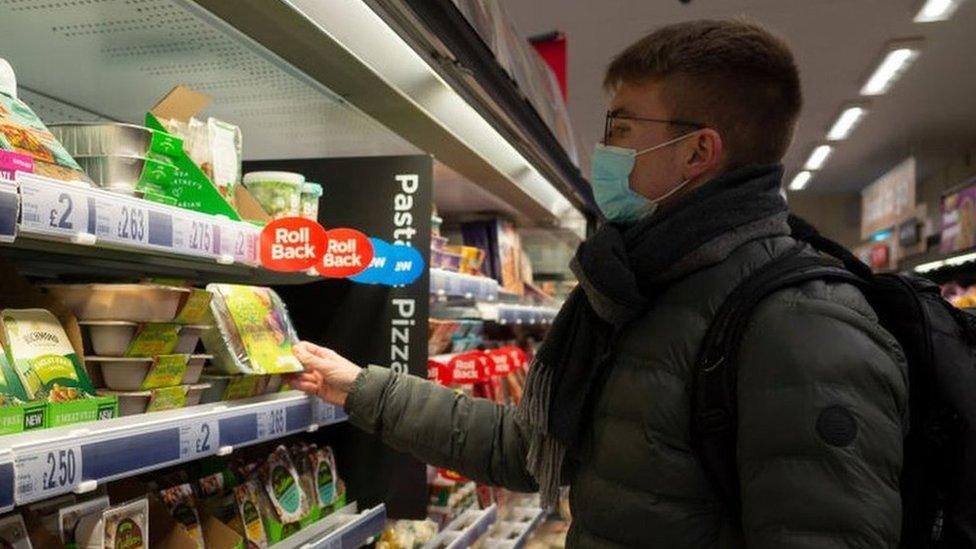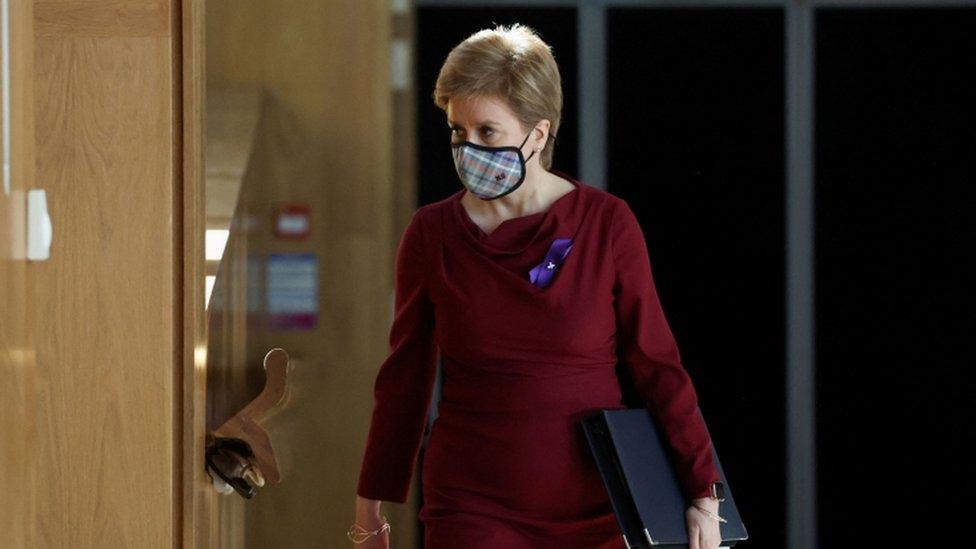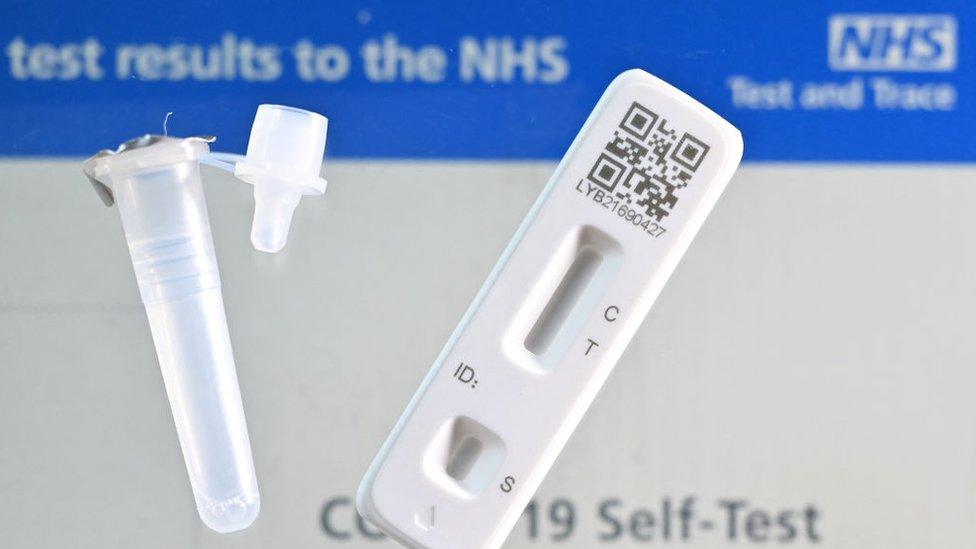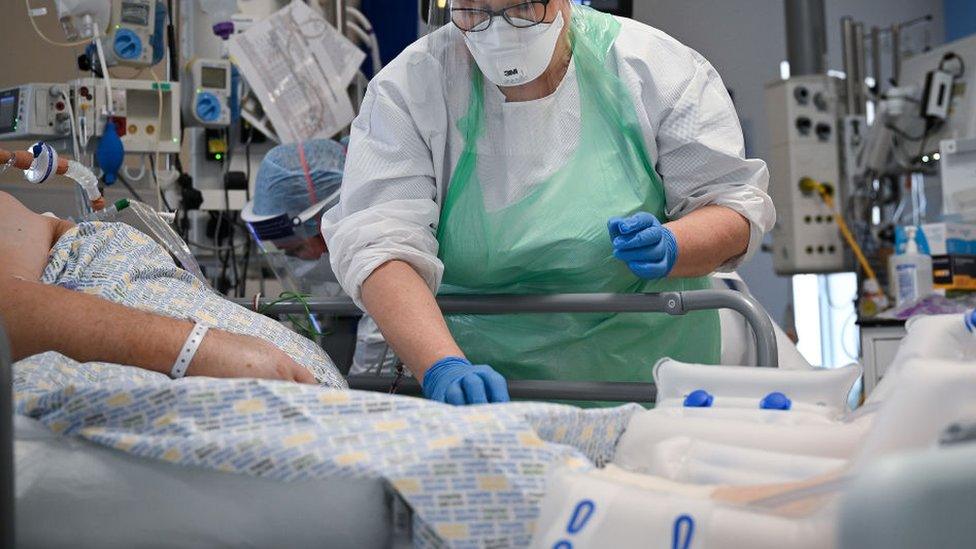Lifting of Scottish face mask laws confirmed
- Published

People in Scotland are still legally required to wear face coverings in shops and other indoor public places, and on public transport
The legal requirement to wear face coverings in many indoor settings in Scotland will end next Monday.
The move had been delayed twice amid record levels of Covid cases and high numbers of people in hospital with the virus.
With the infection rate now falling across the country, the government has confirmed the laws will be lifted.
But it strongly advised people to continue wearing masks in crowded indoor places and on public transport.
All of Scotland's other legal restrictions have already been lifted.
The number of daily reported Covid cases in Scotland hit about 12,000 in March but the figure is now about 5,000.
The Scottish government said this showed that the situation had generally improved in recent weeks, but that the virus had still not gone away - with the NHS continuing to face significant pressures.
First Minister Nicola Sturgeon said a fortnight ago that she expected the face covering rules to be lifted on Easter Monday.
The government has now confirmed the move in a letter to the Scottish Parliament's presiding officer and relevant committee conveners.
Ms Sturgeon said the country had made steady progress towards a greater sense of normality and a more sustainable way of managing the virus.
However, she stressed that the NHS was still under pressure and the most vulnerable members of society could still benefit from people taking additional measures to protect them from the virus.
Despite the use of face coverings no longer being a legal requirement, she strongly recommended that people "continue wearing face coverings in indoor settings where possible, and particularly when significant numbers of people are present".

The first minister had twice delayed the lifting of the laws
The face covering laws had originally been due to be removed on 21 March, with the first minister initially deciding to delay the move until 4 April - before subsequently announcing a further two-week delay
However, the requirement to wear face masks at funerals and weddings was lifted on 4 April as planned.
Linda Bauld, Professor of Public Health at the University of Edinburgh, has said that with the number of people in hospitals and intensive care units falling, it was "reasonable for the government to be looking ahead".
But she said people including shoppers and school pupils who want to continue wearing face masks should be supported.
Prof Bauld told BBC Radio's Good Morning Scotland programme: "There are a lot of people in the country who have had Covid recently, and even if they've not been severely unwell they've been feeling pretty miserable.
"So I think anything like wearing a face covering when you're on public transport in future months might avoid us picking up this virus or another.
"What I have observed in England is a number of businesses, including supermarkets, that are very strongly advising (the wearing of face masks) and I expect that to continue here."
'Trust the public'
The Scottish Conservatives had previously criticised the delays in lifting the laws around shops, public transport and other indoor public places.
The party's public health spokeswoman, Sue Webber, said the confirmation that the restrictions would now be lifted was welcome but should have happened several weeks ago.
She added: "The SNP government have been far too slow to trust the public to use their judgement on wearing face masks, having twice U-turned on lifting the blanket curb before.
"This was frustrating for many people and damaging for businesses."
The Scottish Licensed Trade Association had described the previous delays as "bitterly disappointing", arguing many people were already failing to wear masks so keeping the law in place would make little difference.
And the Scottish Chambers of Commerce warned that the "prolonging of Covid-19 rules" might make Scotland a less attractive tourist destination.
What else is changing?

Free lateral flow tests will no longer be available for the general public
Other changes that will come into effect on Monday mean most people who do not have Covid symptoms will no longer be asked to take lateral flow tests.
Free lateral flow kits will no longer be available for the general population - although they will still be provided for clinical care, for health and social care workers and for people visiting vulnerable individuals in care homes or hospitals.
People with symptoms will still need to isolate and get a PCR test until the end of April.
And vaccinated close contacts of someone with Covid should continue to test daily for seven days with lateral flow devices.
However, test sites will close at the start of May and people with symptoms will no longer be advised that they need to take a test.
The public health advice for people who feel unwell will be to stay at home until they feel better, to reduce the risk of infecting other people.
Related topics
- Published13 April 2022
